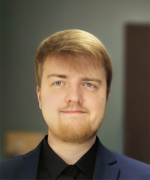Alexander Thier
 Photo: Privat
Photo: Privat
Alexander Thier
Research associate at CATALPA and in Education Technology in Digital Transformation
Email: alexander.thier
Universitätsstraße 27 – PRG / Building 5
Raum C 116 (1st floor)
58097 Hagen
What is my role within CATALPA?
As a media computer scientist and research associate in Educational Technologies for Digital Transformation and within the CATALPA research area, I focus on the design and investigation of innovative learning technologies.
My work centers on immersive technologies, artificial intelligence, and gamification principles. The goal is to enhance and sustainably transform everyday learning experiences for both educators and learners through digital tools.
Why CATALPA?
CATALPA offers an interdisciplinary research environment that bridges technological innovation with educational relevance. Close collaboration with experts in fields such as educational research, data science, artificial intelligence, and learning technologies enables the development of practical solutions to complex challenges in education.
-
- Research Associate at CATALPA and in Educational Technologies for Digital Transformation (since 2025)
- M.A. in Design Interactive Media, Furtwangen University (2023–2025)
- B.Sc. in Online-Media, Furtwangen University (2019–2023)
-
My research focuses on the intersection of technology and education. In particular, I am interested in:
- the use of immersive technologies to enhance learning experiences,
- the integration of artificial intelligence for personalized learning support,
- and the design of gamified learning environments that foster motivation and interactivity.
-
- Göpfert, Ferdinand; Johannes, Suzan; Schulenburg, Johann; Seibert, Julian; Thier, Alexander; Krach, Thomas; Lasowski, Ruxandra (2024): Social Connections between Large Language Model Agents. Mensch und Computer 2024 - Workshopband. DOI: 10.18420/muc2024-mci-src-373. Gesellschaft für Informatik e.V.. MCI: Student Research Competition. Karlsruhe. 1.-4. September 2024
-

